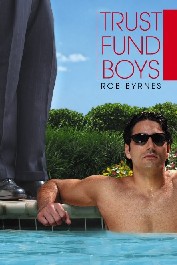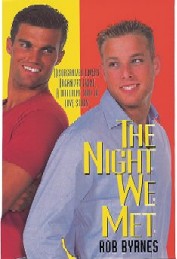WHAT WENT WRONG?
Via Towleroad:
Marriage comes adrift as quickly as it came about.If these two kids couldn't make it, what chance do the rest of us have?
Richard Thornton and Andries Jacobs’s marriage is the very definition of a whirlwind romance.
Barely a month after a chance encounter in a West Rand shopping mall, they exchanged rings and vows of fidelity on January 5, one of the first same-sex couples to be married in South Africa under the then newly enacted Civil Unions Act.
Ironically, they could become the first divorced under the legislation.
Just two months later, the marriage has crumbled and 52- year-old Thornton has filed for divorce on the grounds of irreconcilable differences and desertion.
Jacobs, 20, packed his bags in the dead of night just weeks into the marriage as arguments over coming home late and overpossessiveness escalated.
Still, Thornton this week attempted an emotional reconciliation with his partner as the rain sobbed over them in the street outside the younger man’s new home.
He says he has nothing but his love for the man he desperately wants back.
“I know that Andries is mine; but he’s very young ... very young.”
He had thought perhaps the 20-year-old couldn’t take “the pressure” and needed to be alone, but later discovered he had moved in with another man — just a few blocks from their home.
Despite this, says Thornton, “the blood’s not that bad”.
“We are married. We are still legally married, until — if — the divorce comes through.”
He is uncertain whether he wants to go through with it.
Earlier this week he met his estranged partner at a game reserve where, he says, they renewed their vows and Jacobs again promised to come home.
The garden flat they shared briefly is decorated with theatre posters, language manuals and other bric-a-brac which are reminders of Thornton’s once-flourishing career as a producer and director. His polished accent and flamboyant gestures also tell of years spent on stage.
He and Jacobs had known tongues would wag in their home town. The 50something some-time theatre director and producer and the 20-year-old who was then working as a security guard at a local mall cut an unusual sight on the streets of the mining town, dotted with grocery stores, farming equipment proprietors and steeples of the NG Kerk.
Krugersdorp is still “conservative”, Thornton explains, his tone suggesting this is a euphemism for deep-seated prejudice against homosexuals.
Yet it was for God, and for the community, that he says he proposed to Jacobs. “I wanted everything to be right in the eyes of God, I didn’t do it because it was the in thing to do.”
Thornton says Jacobs found it difficult being in a gay marriage in the town.
His friends had warned him against the union, saying Jacobs was too young for him.
Jacobs’ family, Thornton says, were in denial that their son was gay. One of the only things he wanted to do after they married, and still wants to do, is to visit his in-laws and be accepted.
He tells of how they would whisper endearments to one another in private, but when they were in public, Jacobs seemed ashamed.
In the week before leaving their home, Jacobs told him: “Ek is lief vir jou, maar ek is nie gewoond daaraan nie (I love you, but I’m not accustomed to this).”
“It hurts, it really hurts,” Thornton says.
Thornton says he and his estranged partner agreed when they married that they would share the expenses of the home, but as it ended up, “he let me do all the hard work”.
Earning marginally more than Jacobs, it was he who bought “the little essentials” they needed to survive.
“He would say, Ag liefie, mag ons dit koop!’ (He would beg me to buy things). It was all on my neck.”








<< Home